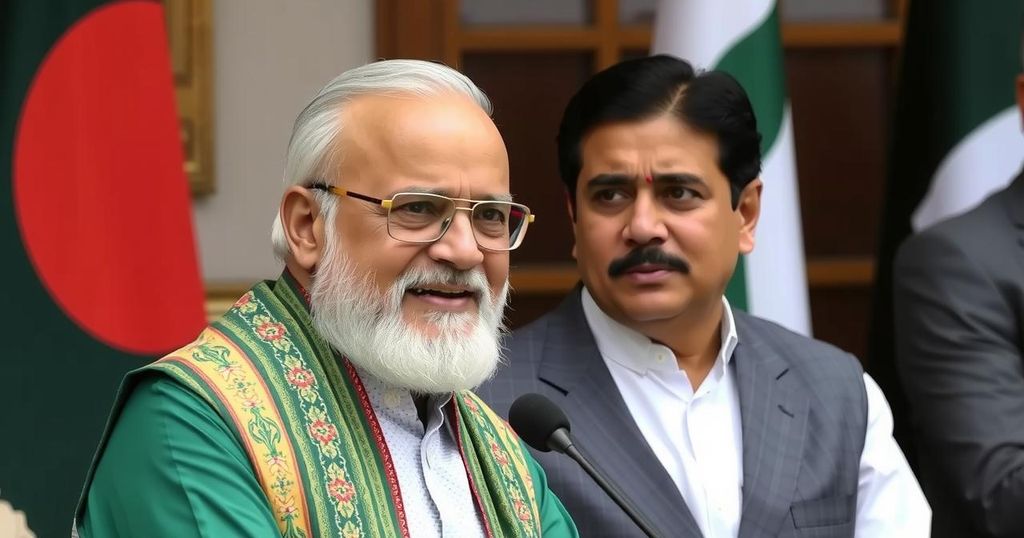Bangladesh’s interim leader Muhammad Yunus met with Pakistan PM Shehbaz Sharif at the 11th D-8 Summit in Cairo, expressing a desire to resolve historical issues stemming from the 1971 separation. This meeting is viewed as significant amid Bangladesh’s strained relations with India. Both leaders discussed enhancing trade and cultural ties, reaffirming a commitment to collaborative development.
Bangladesh’s interim leader, Prof. Dr. Muhammad Yunus, engaged in a significant diplomatic meeting with Pakistan’s Prime Minister, Shehbaz Sharif, during the 11th D-8 Summit held in Cairo, Egypt. This encounter is viewed as a pivotal moment for Bangladesh, especially given its ongoing strained relations with India. Yunus expressed a desire to address and resolve historical grievances that have persisted since Bangladesh’s separation from Pakistan in 1971.
Historically, Bangladesh and Pakistan were once united as one nation until the latter’s independence was achieved through a tumultuous conflict that ultimately led the country closer to India. The momentum of political unrest in Bangladesh ultimately compelled its former leader, Sheikh Hasina, to seek asylum in India. Currently, with India’s solid support for Sheikh Hasina, the new leadership in Bangladesh appears to be reevaluating its diplomatic stance towards India, thus making the meeting with PM Sharif all the more significant.
Prime Minister Sharif shared on social media platform X, “Had a very warm and cordial exchange with my friend Prof. Dr. Muhammad Yunus… We discussed strengthening historical and cultural ties, increasing trade… Together, we reaffirmed our commitment to deepen bilateral and multilateral collaboration for the shared prosperity of our peoples.” This sentiment of collaboration was echoed in a statement released from Yunus’ office, where he emphasized the importance of addressing longstanding issues to facilitate progress for both nations.
This diplomatic exchange symbolizes a potential thaw in relations between Bangladesh and Pakistan, suggesting a collaborative approach moving forward. Yunus and Sharif’s discussions reflect a renewed commitment to enhancing trade, fostering cooperation in technology and industry, and increasing cultural exchanges, all of which could lead to mutual benefits for both countries.
The relationship between Bangladesh and Pakistan has been historically tumultuous since the latter’s independence in 1971, following a brutal war for liberation. This conflict led to the formation of Bangladesh, which has since maintained a complex relationship with Pakistan. While earlier administrations of Bangladesh managed a somewhat strained diplomatic rapport with Pakistan, recent developments indicate that a reevaluation of these historic ties might be occurring. The political climate in Bangladesh has shifted considerably since the rise of Sheikh Hasina, who has cultivated close relations with India, complicating relations with Pakistan in the process. The recent meeting between Yunus and Sharif could signify a strategic pivot aimed at repairing bilateral ties amidst a complicated geopolitical landscape.
In conclusion, the meeting between Bangladesh’s interim leader Muhammad Yunus and Pakistan’s Prime Minister Shehbaz Sharif marks a notable step towards addressing historical grievances and fostering cooperation between the two nations. Their discussions can potentially pave the way for increased trade and cultural exchanges, which may benefit both countries. This endeavor reflects an important recalibration of diplomatic relations, suggesting that, despite past conflicts, there is willingness on both sides to pursue mutual development and collaboration.
Original Source: www.india.com






